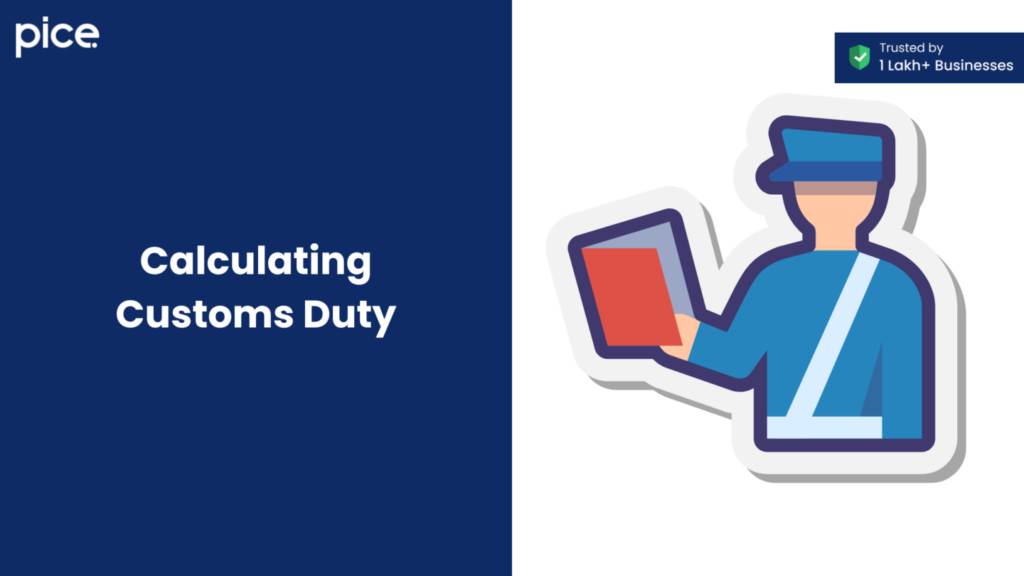Customs Duty in India: Overview, Types, Rates and Calculation
- 6 Sep 24
- 10 mins

Customs Duty in India: Overview, Types, Rates and Calculation
Key Takeaways
- Customs duty is a tax imposed on the import of goods into India, aimed at regulating international trade and generating revenue.
- Various types of customs duties include Basic Customs Duty, IGST, Social Welfare Surcharge, and Anti-Dumping Duty.
- The Customs Act of 1962 empowers the government to regulate imports and exports, ensuring proper procedures and tax compliance.
- Custom duty calculations are based on the value of goods using methods such as the comparative value method and computed value method.
- Several goods, including charitable items and personal-use products, are exempt from customs duty.
India imports goods from various countries, resulting in an active participation in international trade. To carry on this trade smoothly and streamline tax payments, the government introduced the ‘Customs Duty’. This blog contains every detail about GST on customs duty. Read on to learn their objectives, types, rates and calculations regarding these indirect taxes in detail.
Understanding Customs Duty
The tax that the government imposes on the import of goods from a foreign country into India is referred to as the ‘Customs Duty’. There were various objectives that the government had when introducing customs duty. These included diversifications of income sources, ensuring seamless regulation of trade and many more.
Custom duty can be broadly classified as import duty and export duty. Import duty is levied during the inward supply of services or goods and export duty is applicable for the outward supply of services or goods.
The customs duty rates on import services and goods depend on various factors, like the materials they are made of, the country from which these goods have been imported and so on. There are several rules defined under the Customs Duty Act that you must abide by. Doing so will help you accurately calculate these taxes and pay them off online easily.
The Customs Act of 1962 gives the government authority to regulate the import and export of goods and establish procedures for the same. Usually, the Central Board of Excise & Customs (CBEC) under the Department of Revenue, within the Ministry of Finance, manages laws associated with excise duty.
The CBEC is responsible for framing various policies related to administration, collection of taxes and so on. It looks after the regulatory administration of various departments within the framework as well as tax administration of inland travel as well as foreign travel. Know about the purposes of customs duty in detail in the next section of the blog.
Purpose of Customs Duty
There were several objectives that the government had when introducing the customs duty. These include:
- Generation of Revenues: Custom duty helps the government generate substantial revenue. This tax collection helps the government in financing infrastructure development and public services.
- Seamless Regulation of Trade: The implementation of customs duty ensures a smooth transfer of goods across borders. In addition, it helps reinforce business compliance with safety standards, trade regulations, payment of taxes and intellectual property rights.
- Protection of Domestic Industries: Custom duty even protects domestic industries from foreign competitors, by imposing tariffs on imported goods and through basic custom duty, anti-dumping duty or safeguard duty. Doing so safeguards the jobs of the citizens as well as fosters the economic growth of the country.
- Tool for Economic Policy: To efficiently implement economic policies, the government often employs the customs duty rates as a crucial tool. These include discouraging imports of certain goods, promoting the export of special goods and so on.
To properly serve the purposes of customs duty, the government has introduced several types of this tax such as basic customs duty, IGST, etc. Know about them in detail to calculate the total taxes to be paid.
Various Types of Customs Duties
The different types of custom duty charges applicable during international trade are as follows:
- Basic Customs Duty
The rates for basic customs duty usually range between 0% and 100%, depending upon the HS code of the goods supplied. The actual customs duty fee depends on the region from where they are being imported, the type of goods and the products using which they have been made. It applies to all goods in India except for certain life-saving drugs. Basic customs duty is also applicable to the import of services.
- Integrated Goods and Services Tax (IGST)
The government introduced this type of customs duty in the year 2017 to bring all imported goods and local goods under one of seven different rates. The rate of duty chargeable under this category includes 5%, 12%, 18% and 28% on inter-state supply. Importers use this customs duty type to claim Input Tax Credits, which can help them save on taxes.
- Social Welfare Surcharge
The government introduced a social welfare surcharge in 2018 for taxable persons to support social welfare projects. It replaced the Education Cess and is applicable at fixed custom duty rates of 10%.
- GST Compensation Cess
The GST Compensation Cess primarily depends on the type of product. The government introduced this charge to compensate for the loss of revenue for state governments after the implementation of IGST. Some product types that fall under this category include tobacco, coal, cars, etc.
- Anti-Dumping Duty
The anti-dumping duty was introduced by the government to check on the dumping practice, which is considered unfair international trade. Dumping refers to the practice of selling imported goods below the market value and destroying the supply chain in the local market for that product. The anti-dumping duty varies as per the latest notification from the government.
- Safeguard Duty
The Indian Customs authorities imposed the safeguard duty on products that are imported into the country, which damages the sales of local products.
- Customs Handling Fee
The customs handling fee applies to the combined cost of freights, goods and insurance. The rate of customs duty for this type is set at 1%.
Once you are aware of these charges applicable, know how you can calculate the customs duty payable when importing goods in India.
💡 If you want to pay your GST with Credit Card, then download Pice Business Payment App. Pice is the one stop app for all paying all your business expenses.
How to Calculate Customs Duty in India?

You can calculate applicable custom duties in India using the value of goods, or what is popularly known as the ad valorem basis. The Customs Valuation (Determination of Value of Imported Goods) Rules, 2007, underlines various rules that help in determining the value of these goods and consequently the rate of customs duty. These rules ensure the correct valuation of goods, leaving no room for doubts and confusion.
Some essential rules involved in the calculation of the value of goods when determining applicable customs duties are as follows:
- Rule 4 & 5 (Comparative Value Method): It compares the transactional value of a good with similar items.
- Rule 7 (Deductive Value Method): This method uses the selling price of goods as it is in the importing country.
- Rule 8 (Computed Value Method): It uses the cost of materials employed to prepare the goods along with fabrication costs and profit in the country of origin.
- Rule 9 (Fallback Method): This method uses the above three methods mentioned with an added element of flexibility.
After you calculate the total customs duty, you can pay them online with just a few clicks from the comfort of your home.
Online Customs Duty
With the transition to digitisation, even the duty of customs can be paid online. The steps for payment of custom duty include:
Step 1: Navigate to the official ICEGATE portal.
Step 2: Log in to the e-payment portal using your login credentials.
Step 3: Accurately input your export code or import code when making the payment of customs duty.
Step 4: Once done, click on the 'e-payment' button present on the screen.
Step 5: After that, you can easily check the applicable challans under your name.
Step 6: Select the challan that you want to pay from the applicable options.
Step 7: Next, choose the payment method that you are comfortable with.
Step 8: Once done, you will be redirected to the payment gateway.
Step 9: Complete the payment by choosing your preferred option.
Step 10: After that, click on the ‘Print’ button and save a copy of the payment of tax.
Goods Exempted from Customs Duty
Following are some goods and services that have been exempted from customs duty payment:
- Goods for Charitable Organisations: There are various NGOs that import medicines to distribute to the minor communities. Usually, no customs duty applies to them. One of the notable examples of such goods is lifesaving drugs like vaccines.
- Goods Imported for Personal Use: In scenarios where a student moves abroad to study, they will have to carry books and clothes across the border. On such occasions, they will not have to pay additional charges for importing their goods.
- Product Samples of Negligible Value: Fashion designers often need to import swatches of various clothing materials for their designs. Even then no customs duty charge is levied when importing goods.
Some other items on which the tax officers have revised customs duty include:
- Refrigerators,
- Air-conditioners,
- Footwear,
- Washing machines,
- Furniture fittings,
- Tableware,
- Jewellery, etc.
Final Word
There has been a notable impact of GST on customs duty recently, leading to a change in the taxes charged on these goods. It has a prominent influence on international trade as well. Hence, it is essential that you abide by the laws under the Customs Act, 1962 and not miss out on their timely payment. Otherwise, you might face various hassles in the form of punishment and penalties during the transportation of goods across borders.
 By
By 
















